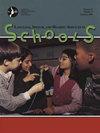The Invisible Workload of School-Based Speech-Language Pathologists Who Identify as Overwhelmed: A Grounded Theory Study.
IF 2.9
3区 医学
Q1 AUDIOLOGY & SPEECH-LANGUAGE PATHOLOGY
Language Speech and Hearing Services in Schools
Pub Date : 2025-07-11
DOI:10.1044/2025_lshss-24-00098
引用次数: 0
Abstract
PURPOSE This qualitative study investigated the lived experience of school-based speech-language pathologists (SLPs) who self-identify as overwhelmed. The goal was to devise a formal explanation of the reasons for such overwhelm. METHOD Seven elementary and five secondary school SLPs in two separate focus groups discussed the following questions: (a) How are you advocating for your needs as an SLP? (b) Do you know how to advocate for yourself? (c) How confident are you in advocating for your needs? (d) Do you feel safe to advocate for your needs? Data were analyzed according to the tenets of grounded theory, resulting in a formal theoretical model. RESULTS Participants indicated an invisible workload for school-based SLPs consisting of three major factors. One, involved parties (teachers, administrators, parents, etc.) do not understand SLPs' roles and responsibilities; as a result, SLPs have to advocate for themselves relentlessly. Two, organizational structure all but ensures that their advocacy is unsuccessful. Three, SLP culture, consisting of perfectionism and a tendency to lack boundaries, exacerbates the situation. A mitigating factor was also identified. SLPs who set boundaries firmly and advocate collectively fare better than SLPs who do not. However, even they are often ineffectual in the face of structural barriers. CONCLUSIONS Results indicated a direction for future research. A survey instrument that captures the dimensions of SLP overwhelm identified in this study should be deployed to assess the prevalence and severity of these issues. Also, it is argued that top-down action by systems-level players is paramount to addressing school-based SLP overwhelm.校本言语语言病理学家的隐性工作量:一项有根据的理论研究。
目的本研究旨在探讨自我认同为“不知所措”的校内语言病理学家的生活体验。我们的目标是设计出一种正式的解释,来解释这种压倒性的原因。方法7个小学和5个中学的SLP在两个独立的焦点小组中讨论了以下问题:(a)你是如何倡导你作为SLP的需求的?你知道如何为自己辩护吗?(c)你对倡导你的需要有多大信心?(d)你是否觉得为自己的需要辩护是安全的?根据扎根理论的原则对数据进行分析,形成正式的理论模型。结果:被调查者认为,校本slp的隐性工作量由三个主要因素组成。第一,相关方(教师、管理人员、家长等)不了解特殊学生的角色和责任;因此,slp必须坚持不懈地为自己辩护。第二,组织结构几乎保证了他们的倡导是不成功的。第三,由完美主义和缺乏界限的倾向组成的SLP文化加剧了这种情况。还确定了一个减轻因素。坚定地设定界限并倡导集体的slp比不这样做的slp表现得更好。然而,面对结构性障碍,即使它们也往往是无效的。结论研究结果为今后的研究指明了方向。应该采用一种调查工具,捕捉本研究中确定的SLP压倒的维度,以评估这些问题的普遍性和严重性。此外,有人认为系统级参与者自上而下的行动对于解决基于学校的SLP压倒是至关重要的。
本文章由计算机程序翻译,如有差异,请以英文原文为准。
求助全文
约1分钟内获得全文
求助全文
来源期刊

Language Speech and Hearing Services in Schools
Social Sciences-Linguistics and Language
CiteScore
4.40
自引率
12.50%
发文量
165
期刊介绍:
Mission: LSHSS publishes peer-reviewed research and other scholarly articles pertaining to the practice of audiology and speech-language pathology in the schools, focusing on children and adolescents. The journal is an international outlet for clinical research and is designed to promote development and analysis of approaches concerning the delivery of services to the school-aged population. LSHSS seeks to advance evidence-based practice by disseminating the results of new studies as well as providing a forum for critical reviews and meta-analyses of previously published work.
Scope: The broad field of audiology and speech-language pathology as practiced in schools, including aural rehabilitation; augmentative and alternative communication; childhood apraxia of speech; classroom acoustics; cognitive impairment; craniofacial disorders; fluency disorders; hearing-assistive technology; language disorders; literacy disorders including reading, writing, and spelling; motor speech disorders; speech sound disorders; swallowing, dysphagia, and feeding disorders; voice disorders.
 求助内容:
求助内容: 应助结果提醒方式:
应助结果提醒方式:


